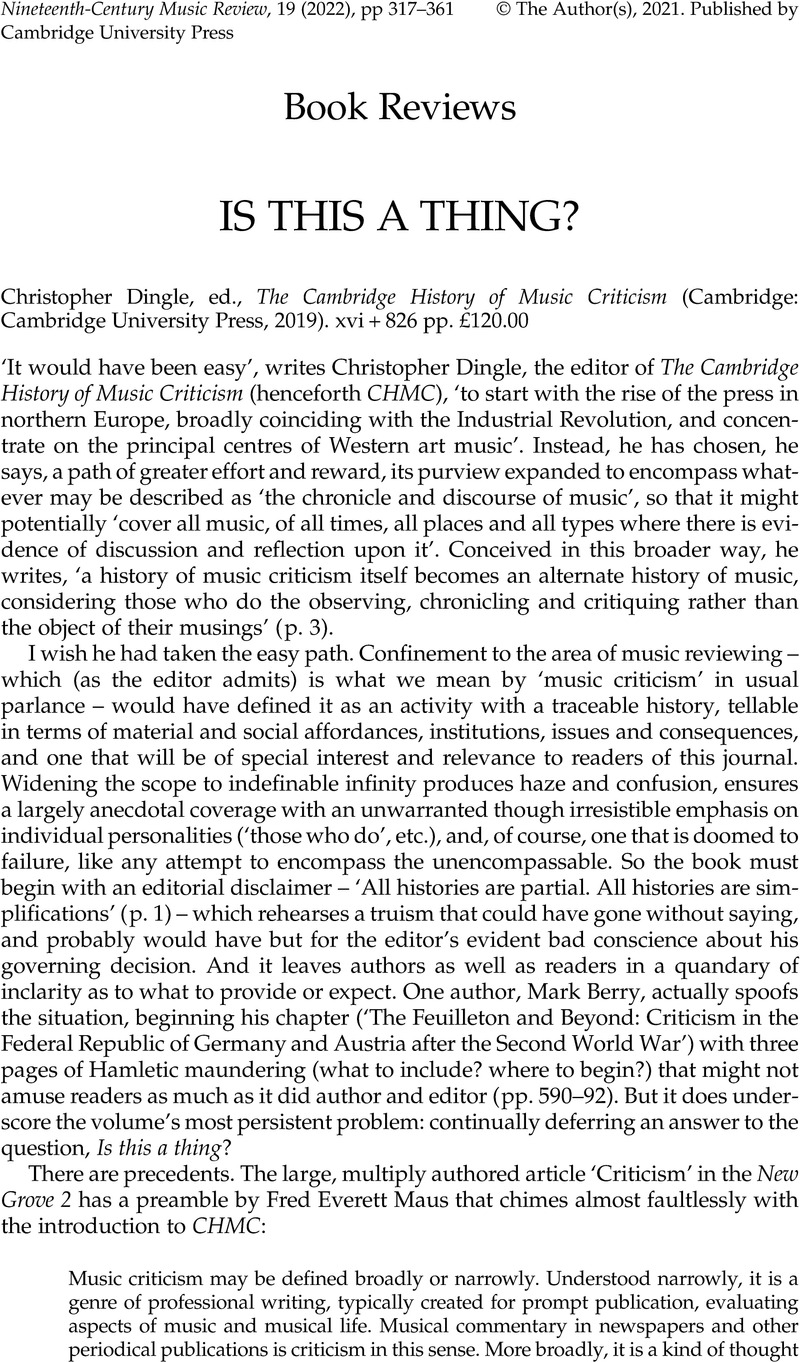No CrossRef data available.
Published online by Cambridge University Press: 02 December 2021

1 Fred Everett Maus, ‘Criticism’. Grove Music Online, Oxford Music Online, www.Oxfordmusic.com (accessed 18 April 2021).
2 See the Introduction to Jean-Jacques Nattiez, Music and Discourse: Toward a Semiology of Music, trans. Carolyn Abbate (Princeton: Princeton University Press, 1990): 3–37.
3 Kerman, Joseph, ‘A Profile for American Musicology’, Journal of the American Musicological Society, 18 (1965): 61–9CrossRefGoogle Scholar, at 63.
4 Richard P. Blackmur, ‘A Critic's Job of Work’, in idem, The Double Agent: Essays in Craft and Elucidation (New York: Arrow Editions, 1935): 269; the lovely characterization is from James Coakley, review of The Esthetic of Jean Cocteau by Lydia Crowson, Comparative Drama, 15 (1981): 283.
5 ‘Russia: Red on White’, Time 44, no. 25 (18 December 1944): 34–6. http://content.time.com/time/subscriber/article/0,33009,778271,00.html.
6 [David Zaslavsky], ‘Muddle Instead of Music’ (Sumbur vmesto muzyki), https://sutalkmusic.files.wordpress.com/2012/11/muddle-instead-of-music.pdf.
7 ‘За последнее время я по уши влюбился в некоторые новые произведения, и среди них первое место занимает XVIII симфония Мясковского. До чего она мне нравится, и сказать не умею. В ее музыке много жизнерадостности и задорного веселья. Особенно в первой части (там, знаете, есть такой замечательный один пассажик, который повторяется раза 3–4, присутствует он и в финале. Вы, конечно, догадываетесь, о каком пассаже я говорю) … (А пассаж из первой части так вот около уха и вьется).’
8 ‘. . . будучи человеком одаренным, высказывает суждения более свежие и глубокие, чем наша «присяжная критика»’. Алексей Александрович Иконников, Художник наших дней Н. Я. Мясковский (Moscow: Muzgiz, 1940): 240; Ikonnikov, Alexei A., Myaskovsky: His Life and Work, translated from the Russian (New York: Philosophical Library, 1946): 59–60Google Scholar.
9 Théophile Gautier, ‘Salon de 1868’, Moniteur universel, 11 May 1868, quoted (differently translated) in Robert B. Ray, ‘Critical Senility vs. Overcomprehension: Rock Criticism and the Lesson of the Avant-Garde’, in Pop Music and the Press, ed. Steve Jones (Philadelphia: Temple University Press, 2002): 72–78, at 75; original text (cited from Cenerelli, Bettina B., Dichtung und Kunst: die Transposition d'art bei Théophile Gautier (Stuttgart: Verlag J. B. Metzler, 2000): 254CrossRefGoogle Scholar): ‘En face de ce paradoxe en peinture, il semble qu'on ait peur, si on ne l'admet pas, de passer pour un philistin, un bourgeois, un Joseph Proud'homme, un goîtreux aimant les miniatures et les copies sur porcelaine, ou pis encore, un retardataire trouvant du mérite à l'Enlèvement des Sabines de David. … Il est probable que les tableaux de Courbet, Manet, Monet et tutti quanti renferment des beautés qui nous échappent à nous autres anciennes chevelures romantiques déjà mêlées de fils d'argent’. Joseph Proud'homme was the creation of the caricature artist Henry Monnier (1799–1877) to embody the obtuse bourgeoisie – a French counterpart to Papa Biedermeier.
10 Olin Downes, ‘Music: “Sacre du Printemps” Played’, New York Times, 1 February 1924; for a commentary, see Richard Taruskin, ‘Resisting The Rite’, in idem, Russian Music at Home and Abroad (Oakland: University of California Press, 2016), 395–427, at 416.
11 Or, to quote him exactly: ‘…many times you're living in a fantasy. For example, you think I'm loose. I might have been stricter than the people you thought were strict. The people who you think are radicals might really be conservatives. The people who you think are conservative might really be radical’ (Morton Feldman, ‘Darmstadt Lecture 1984’, transcribed by Ken Muller and Hanfried Blume; https://www.cnvill.net/mfdarmstadt1984.pdf). And then, as the transcript shows (and as Alex Ross, who has quoted it repeatedly, loves to point out), ‘he began to hum the Sibelius Fifth’ (The Rest is Noise (New York: Farrar, Straus and Giroux, 2007): 193).
12 ‘El movement más inexplicable, más estéril, más inútil, de la historia de la música’.
13 Rae, Caroline, ‘In Havana and Paris: The Musical Activities of Alejo Carpentier’, Music & Letters 89 (2008): 373–95CrossRefGoogle Scholar, at 391.
14 The Editors of Encyclopaedia Britannica, ‘Heitor Villa-Lobos’, Encyclopedia Britannica https://www.britannica.com/biography/Heitor-Villa-Lobos.
15 Philip Ewell, ‘Beethoven Was an Above Average Composer’, Music Theory's White Racial Frame, 24 April 2020, https://musictheoryswhiteracialframe.wordpress.com/2020/04/24/beethoven-was-an-above-average-composer-lets-leave-it-at-that/.
16 Robert Commanday, ‘“Klinghoffer” Soars Into S.F.’, San Francisco Chronicle, 1 November 1992, Datebook, 42.